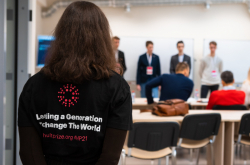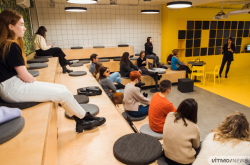ITMO’s first accelerator for foodtech projects in 2022 attracted 55 teams. This year, the program received over 400 applications from Kazan, Perm, Samara, Tomsk, Moscow, and other Russian cities; 63 teams made it through the selection and started working with the project’s trackers, while only 13 of them advanced to the finals. Within three months, the participants managed to turn their ideas into MVPs, create beta versions of their products, and make their first sales. At the same time, the team behind UNUM, a company specializing in eco-friendly packaging, moved on to the pilot stage; they’re now collaborating with X5 Group (Russia's largest food retailer – Ed.) on their first market offering.
“Foodtech accelerators are the place to go for expert opinions, as well as a boost to your knowledge and growth, but the future of a project is, nevertheless, up to its creator. I stay in touch with our graduates, monitor their startups, and give them advice. Some of them then come back to the program afterwards. Like, for instance, this year’s finalists – FoodDate. They first joined the accelerator in 2022. Back then, they only had an idea, but now, they’ve released their app and begun to scale up their project to attract new customers,” notes Maksim Makarov, one of the accelerator’s mentors and an expert at ITMO Technopark.

Demo Day of ITMO’s foodtech accelerator. Photo by Dmitry Grigoryev / ITMO.NEWS
This year, FoodDate won bronze at the accelerator. The team presented a smart app that scans the content of a user’s refrigerator and notifies them if food items are no longer safe to consume. The developers are planning to introduce delivery services into the web app, as well; as envisioned, it will automatically order fresh products to replace those that have expired.
The second place was taken by BestCakeClub. Its creators proposed a designer kit for cake making that will allow users to select a cake of their choice and have all the necessary items delivered right to their home.
But the winner of this year is UNUM – and their technology for producing a foodwaste-based sustainable packaging. The technology works as follows: containers, cups, and measuring spoons are “baked” in an oven. After they’re used, the items take no more than three months to decompose. Notably, the project has been recently ranked among the top technological solutions at BRICS Solutions Awards.
Just like the number of participants, the scope of the accelerator’s partner list has expanded over the past two years. The program now collaborates with about a dozen companies, including X5 Group, VkusVill, Samokat Logistics, FR Technologies, Edelweiss, FoodNet, and others. The partner companies’ staff consult participants, serve as experts at project defenses, and offer financial assistance to the program’s graduates. Additionally, projects at Demo Day were assessed by potential partners and investors.
“I’d advise accelerator students to speak more confidently about sales. Money is the key indicator of a product’s demand and also its value for investors,” stressed Sergey Kunitsyn, the leader for innovation development at VkusVill.

The accelerator’s winner and Sergey Kunitsyn. Photo by Dmitry Grigoryev / ITMO.NEWS
The winning projects also drew the interest of long-established foodtech companies.
“Our company has been around for over a decade. We work for big corporations and restaurants, and we connect them in order to automate the corporate catering process. We got interested in RapiDo’s food delivery app; they managed to significantly reduce the commission rate for delivery from restaurants and therefore the price of the final product. We’re open to joining them as partners or or investing in their project,” says Ekaterina Repina, CEO of NALUNCH.

Demo Day of ITMO’s foodtech accelerator. Photo by Dmitry Grigoryev / ITMO.NEWS
The accelerator program is supported by the Russian Ministry of Science and Higher Education as part of the federal project University Technological Entrepreneurship Platform.





